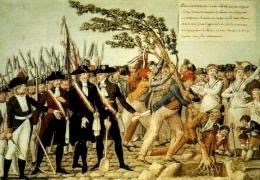Liberty

" … it shades no one unless it intends to shade us all."
Liberty seems more a collective than individual property. Our forebears fought to secure the opportunity to govern themselves, not to ensure that any individual could just do whatever they want. There were innies and outies, of course, so some felt oppressed under the yoke of 'their' so-called freedoms. The conflict was not settled when the British retreated. It simmers, occasionally boiling over, even today, perhaps because of this one complication, that liberty never was and never could have been the property of any individual. It must belong to all. ©2018 by David A. Schmaltz - all rights reserved
Free speech, for instance, never was the same as loose talk. The guarantee to say whatever I want does not extend to yelling fire in any crowded theater or cursing at grandma's table. Some self-censoring, while not explicitly mentioned, was heavily implied. Those who take everything literally struggle to find the edge. Likewise, the right to bear arms is necessarily a limited right, tempered by some up until now largely unnecessary specification. Most seemed to understand the limit of their individual liberty in this respect, which lay right along side where exercising that right might infringe upon others' liberty. Where individuals can't quite grok a limit, the law steps in. The People entrust to the law the enforcement of the will of The People, which delineates the relevant range of any liberty, any freedom, any right, for none were intended to be absolute or endless.
It's necessarily hard work to determine these limits in the absence of a dominant civic identity. Any country founded to revere and respect diversity should properly struggle with maintaining a dominant civic identity, and will most likely eventually fail to do so. Then the question appears: what rightly replaces that originating homogeneity? It seems we dare not cater our definition to some special class lest we erode the founding collective liberty. Reconstruction after the Civil War faced this question and failed the final exam, choosing to disenfranchise large swaths of The People in the interest of preserving a discredited consensus. The law can subjugate justice as well as encourage it.
The current libertarian choir seems to ignore our heritage, replacing it with an everyone for themselves sort of social anarchy. This was always a popular philosophy among those with entrenched advantage and without apparent conscience, but The People cannot abide within any society lacking some more egalitarian center. Nothing distinguishes this structure from any tin pot despotism our society originally fought to distinguish ourselves from.
I believe that we remain sufficiently clueless about what liberty means now that we're trying on different forms of it. Some more focused upon the individual to the exclusion of others, some, perhaps, more focused upon including others to the exclusion of the individual. The Communist/Socialist/Democratic dichotomies hold little meaning in practice, for any governance necessarily straddles all simplifications. Our questions seem too complicated for any sanguine preconception to serve as our template going forward. The founders had no clue, either, just a more narrowly defined context which quite deliberately excluded many who properly belonged to the class they labeled The People. We're working hard to expand the limits of We now. We planted the Tree of Liberty together. I figure that we dare not nurture it in isolation, for, like liberty itself, it shades no one unless it intends to shade us all.


